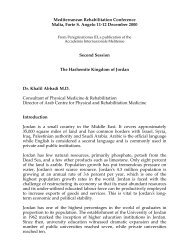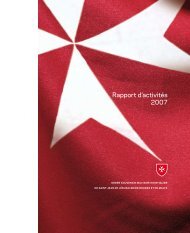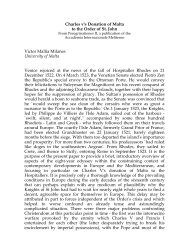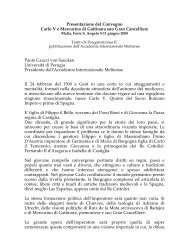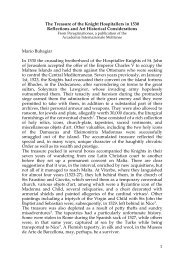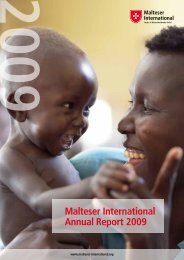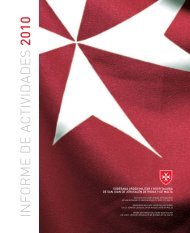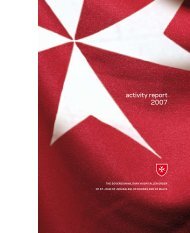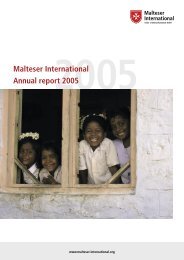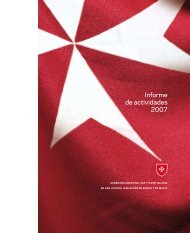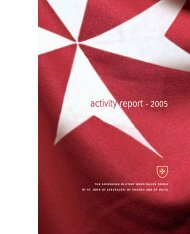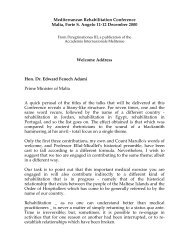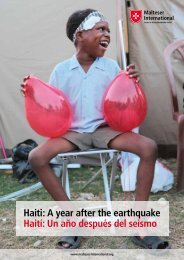Malteser International Annual Report 2007 - Ordine di Malta
Malteser International Annual Report 2007 - Ordine di Malta
Malteser International Annual Report 2007 - Ordine di Malta
You also want an ePaper? Increase the reach of your titles
YUMPU automatically turns print PDFs into web optimized ePapers that Google loves.
Anke Barth<br />
DR Congo: In demonstration gardens, the women learn how to plant vegetables rich in vitamins.<br />
R e f u g e e s a n d i n t e r n a l ly<br />
<strong>di</strong>splaced persons (IDPs )<br />
Worldwide, about 35 million people, the<br />
majority of them women and children,<br />
are on the run from conflicts and human<br />
rights abuses. About ten million of<br />
them have crossed an international<br />
border during their escape. More than<br />
twice as many are on the run within<br />
their own country. Often, they have<br />
to leave everything behind. Therefore,<br />
they are especially vulnerable and need<br />
international protection and assistance.<br />
Refugees have a legal status based<br />
on the international refugee law and<br />
in particular on the Geneva Refugee<br />
Convention established in 1951. The<br />
“non-refoulement” principle prohibits<br />
repatriating people into countries where<br />
their life or their freedom are in danger.<br />
The United Nations High Commissioner<br />
for Refugees (UNHCR) takes care of the<br />
refugees together with humanitarian<br />
partner organisations.<br />
DR Congo: Poster for the fight against the plague in Ituri: “United in the fight against the plague – To prevent an<br />
infection by the plague, we don’t let our children touch dead rats.“(left); “When a person suffers from headache<br />
and has a temperature and a sore throat, you should imme<strong>di</strong>ately take him to the health centre. There, the plague<br />
is cured effectively and free of charge.“ (right).<br />
In the provinces of South Kivu and<br />
Orientale the organisation supports 27<br />
health zones with a total of 380 health<br />
centres. To improve the living con<strong>di</strong>tions<br />
of the people in very remote areas<br />
the organisation, together with local<br />
partners, reconstructs roads and bridges<br />
in the two provinces to enable assistance<br />
to reach the regions. During the year,<br />
<strong>Malteser</strong> <strong>International</strong> further expanded<br />
its activities in the effort to fight against<br />
malaria and <strong>di</strong>stributed 10,000 mosquito<br />
nets to pregnant women. These activities<br />
were supported by the “World Swim for<br />
Malaria” campaign and by “Deutsche<br />
Post World Net”. Together with the World<br />
Food Programme and the European<br />
Commission, <strong>Malteser</strong> <strong>International</strong><br />
Internally <strong>di</strong>splaced persons (IDPs),<br />
in contrast to the refugees, stay within<br />
the borders of their own country.<br />
Therefore, the local authorities and<br />
governments are responsible for them in<br />
the first place. Often, these institutions<br />
cannot or do not want to take care of<br />
them and the international community<br />
is required to intervene. But so far, there<br />
is no convention and no international<br />
organisation with the clear UN- mandate<br />
to protect IDPs (like the UNHCR for<br />
refugees). As a consequence, many of<br />
them live in unofficial camps, slums or on<br />
the constant run without a permanent<br />
home. Humanitarian organisations<br />
provide emergency relief under<br />
precarious circumstances and offer some<br />
kind of protection.<br />
Africa<br />
11



